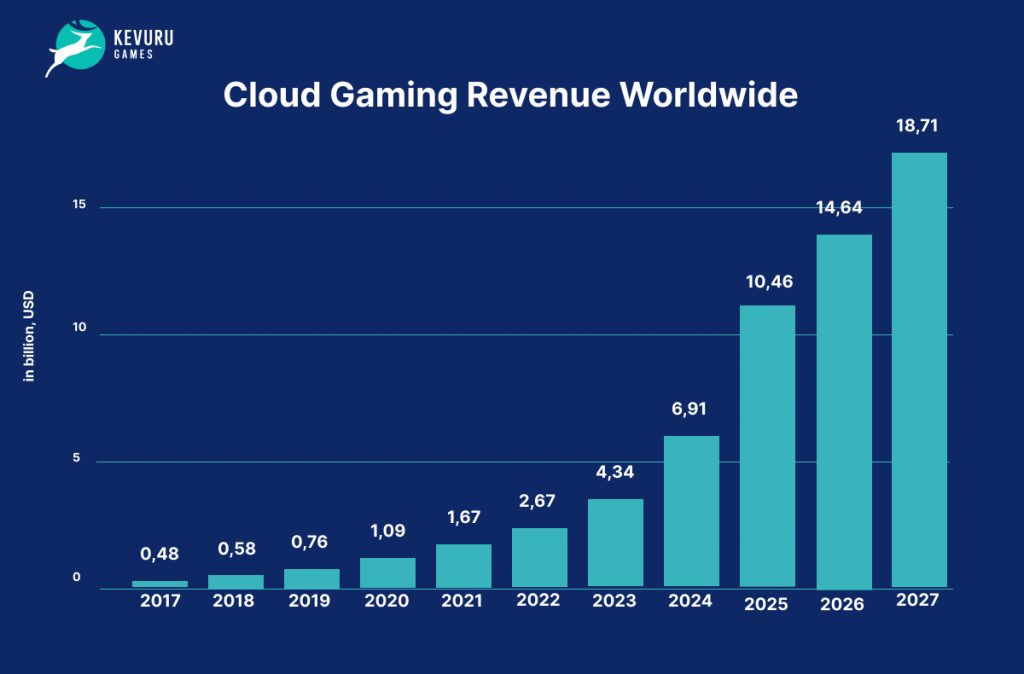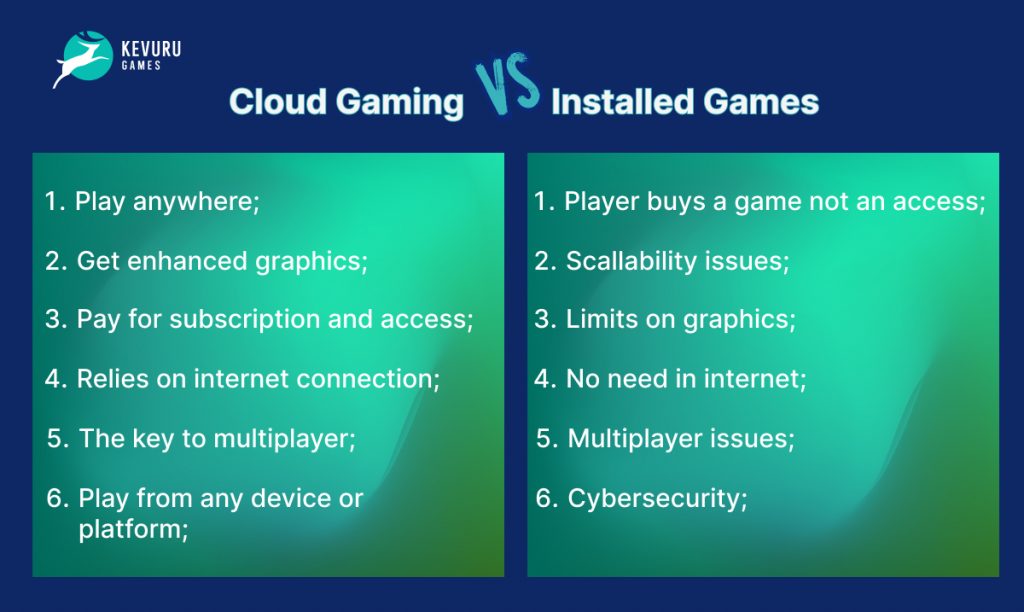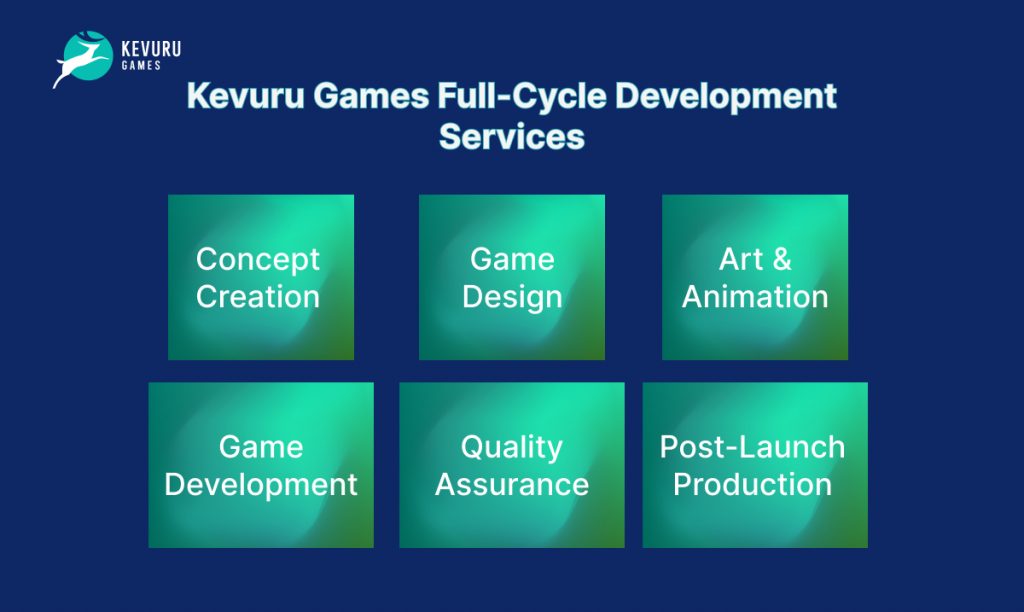Cloud gaming technology is changing the gaming world, ushering in a new era of convenience and accessibility. With this game changing technology, players can enjoy their favorite games anytime, anywhere, without expensive hardware. As playing games gains popularity, cloud services are emerging as a formidable force, embracing the future of gaming.
The cloud gaming market will reach remarkable heights in terms of revenue. Forecasted figures show that revenue is estimated to reach an incredible $4.34 billion in 2023. Experts predict an impressive compound annual growth rate (CAGR 2023-2027) of 44.13%, taking the market volume to an impressive US$18.71 billion by 2027. Such a remarkable increase in revenue underlines the immense potential of the cloud gaming industry.

What Is Cloud Gaming: Pros and Cons of Cloud Gaming
Cloud gaming is actually streaming. It is a service that allows players to stream video games over the internet, eliminating the necessity for powerful local hardware. Virtual servers manage the processing power instead of running games on a gaming console or PC. Through streaming platforms, players can access and play cloud games on mobile devices, such as smartphones, tablets, smart TVs, or low-spec computers.
Cloud gaming offers several advantages, making it an attractive proposition for gamers worldwide:
1. Accessibility and Convenience
You can enjoy their favorite games anytime, anywhere, without being tied to any gaming device. With cloud gaming, you can start playing a game on your home console and seamlessly continue on your smartphone during your daily commute. It provides flexibility and convenience that traditional gaming setups cannot match.
2. Enhanced Graphics and Performance
Cloud gaming leverages high-performance server hardware to deliver impressive graphics and smooth gameplay. By offloading the processing power to remote servers, one can experience games with better visual fidelity and higher frame rates, even on devices with limited hardware capabilities. The cloud infrastructure can handle demanding computational tasks, creating a more immersive experience.
Cost-Effective and scalable cloud gaming eliminates the need for expensive gaming hardware upgrades. Instead of investing in a powerful gaming PC, Playstation, or Xbox console, players can subscribe to cloud gaming services for a fraction of the cost. This affordability makes gaming more accessible to a wider audience. Cloud gaming platforms can also easily scale their resources, ensuring availability during peak gaming times and reducing player wait times.
However, it also brings several challenges, mainly related to internet infrastructure and latency issues. While the industry continues to iron out these creases, it’s evident that cloud gaming is not just a fad. It is a transformative technology that has the potential to reshape the video gaming landscape. As we move forward, it will be fascinating to see how cloud gaming works and influence the future of gaming. Remember, every technology has pros and cons, and cloud gaming is no different. As potential users, weighing these pros and cons can help us make informed decisions about embracing this technology.

The future of cloud gaming
As the world of digital entertainment continues to evolve, one question that has piqued the interest of gamers and tech enthusiasts alike is, “Is cloud gaming the future for video games?”
With its promises of seamless play and high-end quality irrespective of device specifications. But what potential does it hold for shaping the future of video games?
As technology advances, cloud gaming will benefit from dependable internet connection, improved internet speeds, lower latency, and more efficient compression algorithms. These advances will enhance the gaming experience, making cloud gaming virtually indistinguishable from traditional, on-premises gaming setups. With 5G networks and the ongoing development of edge computing, cloud gaming will become even more accessible and seamless.
Cloud gaming opens up new opportunities for gaming business models. Instead of relying solely on game sales, developers and publishers can develop subscription-based services or hybrid models that combine free-to-play elements with premium content. Cloud gaming platforms can also offer unique features such as demos, exclusive early access, or in-game purchases to monetize their services and support game development.
Cloud gaming can reshape the gaming community and the industry as a whole. Cross-platform compatibility allows gamers with different devices and ecosystems to play together, fostering a more inclusive and connected gaming community. The shift to cloud gaming may also influence game design and development as developers focus on creating experiences that leverage the unique capabilities and benefits of cloud-based gaming.
Cloud gaming undoubtedly represents a paradigm shift in the world of video games. It delivers an incredible promise of a high-quality gaming experience accessible to everyone, regardless of dedicated hardware constraints.
Kevuru Games Expertise in Cloud Gaming
Kevuru Games has always worked on interactive, immersive, and innovative gaming experiences. Our approach to game development encompasses everything from concept creation to post-launch support. As a result, we offer our clients a complete development service, whether it’s AAA or an indie game:
Concept Creation: every great game starts with a compelling concept. At Kevuru Games, we develop unique and engaging game ideas that resonate with players.
Game design: The game mechanics, control systems, and rules must be carefully designed to keep the gameplay experience at the forefront.
Art and Animation: Visual appeal plays a crucial role in a game’s success, and the Kevuru team knows this well. Our team of experienced artists and animators bring game environments and characters to life with stunning graphics and fluid animation.
Game Development: Our professional development team uses cutting-edge technologies and development platforms to create robust, scalable, and glitch-free games.
Quality Assurance: It is essential to Kevuru Games’ development process. We conduct thorough testing to identify and fix any bugs or issues so that the final product meets the highest quality and performance standards.
Post-launch support: Our customers receive solid post-launch support that provides updates, patches, and continuous optimization to ensure the game remains fresh and relevant in the evolving gaming landscape.

Once Kevuru Games completes the development of a game, the next crucial step is to secure a reliable cloud platform for hosting. The utilization of cloud elements in game development offers a wide array of choices, with numerous cloud service providers to choose from. However, it is essential to identify the platforms that possess remarkable game development capabilities. Among the various options available, two prominent contenders stand out: Amazon Web Services (AWS) and Microsoft’s Azure.
AWS for Games emerges as the preferred choice among game developers, presenting a comprehensive cluster of Amazon services that cater to every aspect of the game development process. This holistic approach encompasses Cloud Game Development, Game Servers, Live Operations, Game Analytics, Game Security, and AI & Machine Learning. With a staggering collection of 175 distinct services, the AWS website proudly boasts the broadest range of functionalities in the cloud platform market.
Azure for Game Development emerges as a formidable competitor to AWS, as Microsoft strives to challenge the dominance of Amazon in the cloud game dev realm. Azure brings forth a range of compelling features and services that warrant consideration.
The decision between the two depends on our customers’ specific requirements and preferences. Whether one opts for AWS’s comprehensive functionality and popularity or considers the enticing features and services provided by Azure, game developers can leverage these robust cloud platforms to propel their games to new heights.
Summary
Cloud gaming is transforming the gaming industry by offering convenience, accessibility, enhanced graphics, and cost efficiency. With its potential to reshape the future of gaming, cutting edge cloud technology is here to stay. As technology advances and challenges are overcome, cloud gaming will become more seamless and accessible. By working with expert game developers like Kevuru Games and leveraging reliable cloud platforms, established gaming norms, the gaming community can embrace the gaming future and enjoy immersive experiences on multiple devices.











